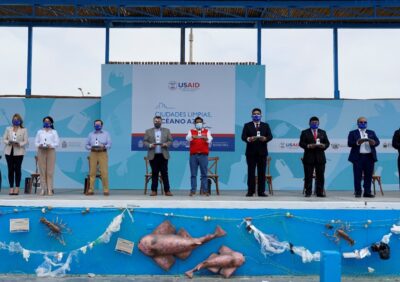Each day, Peru generates more than 20,000 tons of waste—about 0.58 kilograms of waste per capita. While these volumes are comparatively low, inadequate waste management and infrastructure have amplified the impacts of Peru’s waste, allowing it to leak into the environment and generate other human, economic, and climate impacts. With only 64 sanitary landfills throughout the country, inconsistent collection practices, and low recycling rates, urban, coastal, and in-land desert landscapes have become inundated with waste.
Across Peru, infrastructure and support available for solid waste management varies widely. To establish more consistent practices and mitigate ongoing impacts from the country’s waste, Peru has made great progress in developing national laws for solid waste management, including its Comprehensive Solid Waste Management Law (2016), and more recent laws to protect the environment and human health, prioritize circular economies and the recovery and recycling of waste, and promote shared producer responsibility. Local governments are, however, challenged to implement the laws effectively, often faced by shortfalls in tax revenue and municipal capacity. USAID’s Clean Cities, Blue Ocean program is piloting solutions to address these challenges and avert irreversible damage to our oceans, reduce plastic and waste-linked contributions to the climate crisis, and advance other priority development objectives.
Engagement Sites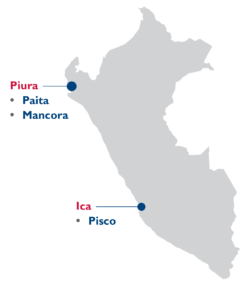
In Peru, USAID is piloting solutions to stop the flow of plastic pollution to the waters within and surrounding the country, including the Pacific Ocean and other inland bodies of water, such as the Piura River—which flows all the way from the Andes to the Pacific Ocean. Clean Cities, Blue Ocean is partnering with the private sector—with companies like the AJE Group and Tetra Pak—to strengthen the country’s north-south recycling corridor, and engaging partners to build a women-led circular economy:
- In Piura, USAID is working in the cities of Paita and Mancora to build the capacity of local government waste management systems and, through local grantees, is working to reduce inorganic waste from the cities’ artisanal fishing sector in Mancora and Paita’s landing sites and develop a social and behavior strategy to support the adoption of responsible waste management behaviors.
- In Ica, USAID is working in the city of Pisco to build local government capacity to advance solid waste management, including through improved and expanded waste collection services. USAID is also working with the local government, businesses, and households to promote and increase waste segregation for improved recycling rates.
Impacts and Results
The program’s activities and impacts in Peru (to date) include:
- Secured over 5,720 metric tons of waste (including approximately 700 metric tons of plastic–the equivalent of nearly 75 million plastic bottles) from leaking into the environment through local recovery and recycling efforts—including Recicla programs that promote waste segregation in households, markets, schools, and hotels in the cities of Pisco, Paita, and Mancora.
- Improved solid waste systems and services for more than 68,000 households and businesses, or more than 1.3 million people, through support to and partnerships with government entities, local organizations, and businesses. This includes the Recicla programs, as well as improved local waste collection to extend services to previously unserved parts of the cities.
- Trained over 970 people from local government, informal waste sector, and local organizations to build capacity for solid waste management planning and programs.
- Awarded over $1.4 million in grant funding to support local organizations and city governments to implement effective, locally-led waste management solutions.
- Introduced 10 new or improved policies or plans to advance local circular economies.
Program Grantees
- In 2023 and 2024, Care Peru and Asociación Solidaridad Países Emergentes (ASPEm) empowered and strengthened the skills of women recyclers, public cleaners, and other women working amongst artisanal fishing, recycling, or waste management value chains in Paita, Mancora, and Pisco. Through their grant, Care delivered empowerment and business management trainings and worked to mainstream gender and prevent gender-based violence at the local level by creating a strengthened women’s network and training public officials.
- From November 2022 to May 2023, Inforegion Agencia de Prensa Ambiental developed an education and communication strategy and related resources to promote the adoption of responsible waste management behaviors, based on formative behavior change research to identify public’s perception regarding waste and the drivers or change.
- From 2022 to 2024, World Wildlife Fund (WWF-Peru) worked to develop inorganic waste management models for fishing operations in Mancora and Paita’s landing sites that focus on circular economy principles—recycling inorganic fishing waste, plastics, and addressing the issue of abandoned, lost, or otherwise discarded fishing gear.
Insights & Updates
See All Insights & Updates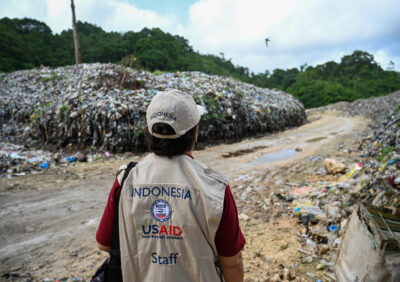
Preventing More Than One Million Tons of Plastic from Entering the Environment
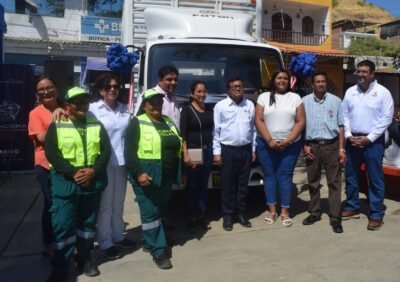
USAID Donates Vehicles to the Municipality of Máncora
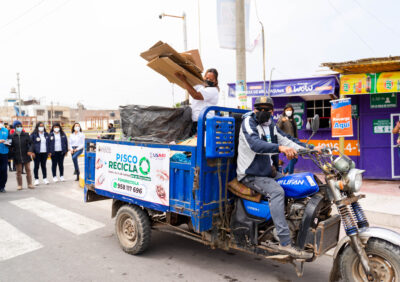
From the Field: Increasing Community Recycling and Recovery of Waste to Reduce Ocean Plastic Pollution
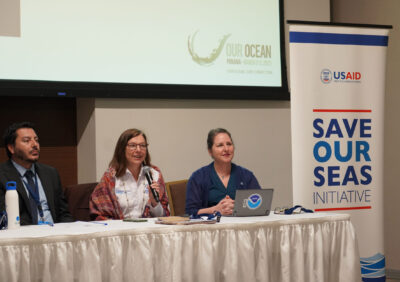
USAID Spotlights Cities at Our Ocean Conference
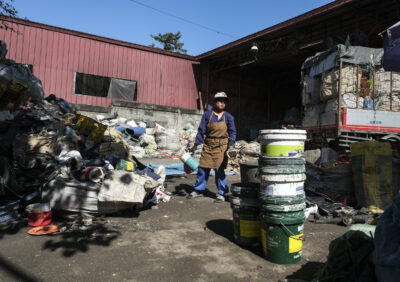
Six Ways USAID is Advancing Gender Equality in the Waste Sector
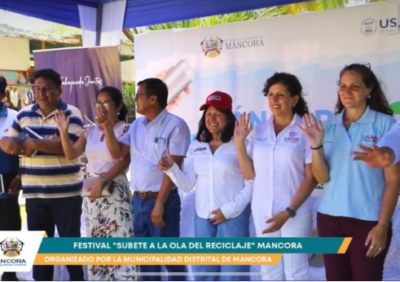
The Festival “Máncora Recycles, Get on the wave of recycling”
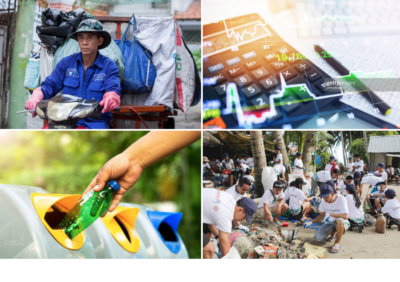
CCBO Launches New Capacity Building Tool for Local Governments
